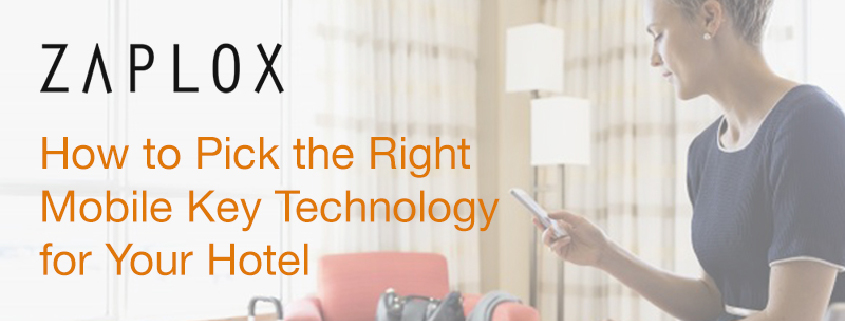Let’s consider a familiar scene: You’ve just rolled your luggage into the hotel lobby after a long trip. As you eye the line at the front desk you silently hope the check-in process will be swift, so you can freshen up and get settled. After a pleasant exchange with the staff, you take your room key and head up towards your suite. Inserting the key card into the slot, you wait to hear the affirmative click and push the door open. Only, that click doesn’t happen — instead, you’re greeted with a blinking red light.
Your room key isn’t working and your initial perception of the hotel has been tarnished.
This is something we have all experienced at some time, and while traditional room keys are by no means nearing total extinction, mobile keyless technology has been making significant waves within the hospitality landscape. Modern guests, especially those of the millennial generation and younger, are continuously demonstrating a desire for increased mobile functionality and convenience. This desire conceptualizes in the form of integrated hotel apps, mobile check-in, and mobile keys, just to name a few. In fact, it is reported that guests using a digital key generally rate a hotel seven points higher than keycard guests.
Of course, there is a wide selection of mobile key applications available to today’s hotelier looking to stay competitive. So, the question becomes, how do you determine which one is right for your hotel?
1. Integration is Key
The mobile door-lock technology you install can’t work unless you have compatible hardware on your door locks. With this in mind, when considering door lock application providers, ensure that their technology integrates with all the leading door lock companies. If this seamless integration is lacking, some mobile lock formats could require you to replace the whole door lock, which isn’t cost effective.
Also, in order to leverage the mobile key system as fully as possible, you may also need to integrate it with other sources of information. That means you need to ensure the application also integrates with the property management system your hotel currently has in place.
When it comes to embracing mobile key technology, seamless integration should be at the top of your list.
2. Perfect the Basics
Efficiency should always be top of mind, and new technology will not be readily embraced if it doesn’t perform its primary function flawlessly. While ‘bells and whistles’ can provide an exciting boost to guest engagement and revenue generation, nothing is more important than the delivery of the core functionality.
Does the lock and unlock function work every time, without any glitch? Is it reliable and highly secure? Does it require the guest to be within 5 feet of the door to their suite, or closer? Does the unlock function work quickly, or does it take a few tries before it registers? Does the app enhance the mobile experience, allowing the guest to effectively bypass lines and receive notifications/alerts tailored to their preferences? Is there a user friendly management tool for the system which includes dashboards, configuration, automation and analytics? Does it have strong security to ensure that the lock can’t be hacked?
Also, keep in mind that introducing a new technology can be tricky – and even more so if that technology is not intuitive as to how you currently work. Consider an intuitive mobile key system that your team can quickly get up to speed with – and is backed by expert support when you need it.
These are all key components you need to consider when determining which mobile key technology provider is the best fit for your hotel.
3. Is it Future-Friendly?
It is critical to invest in technology which demonstrates a clear grasp on the future of guest engagement; from reservations, pre-arrival messages, mobile check-in, and access to a hotel room with a mobile key, to offers, upgrades, and mobile check-out. While the perfection of the ‘basics’ may rule in terms of priority, guest expectations are always evolving and embracing new trends. With this in mind, determine if the technology you are considering has the capacity for advanced capabilities – and available on all platforms. This could range from the functionality of hosting a digital key on more than one device, smart-watch compatibility, mobile concierge to ensure guests aren’t missing the personal touch traditionally received from front desk staff upon check-in, and more.
The mobile key technology you choose today, will stay with you for many years to come. Make sure you choose a future-proof system that can handle the extremely rapid developments in usability and functionality on the hospitality market. What works today may not work for you next year. Or tomorrow. If your current system isn’t evolving with your hotel’s growth and change, then it is time to shop the options. Look for mobile key technology partner that has the flexibility to grow and change with your needs. It’s what we like to call ‘Future-Friendly’.
About the Author
Pernilla Brodd is CMO and head of Strategic Alliances at Zaplox. Pernilla has nearly 30 years of broad experience in the technology field with leading roles in Sales & Marketing, Partner Strategy & Development and Product Management, strongly focused on expansive growth and sales within segments as Hospitality Technology, Supply Chain Logistics, and Global Software and Hardware Vendors – in Europe and North America.



